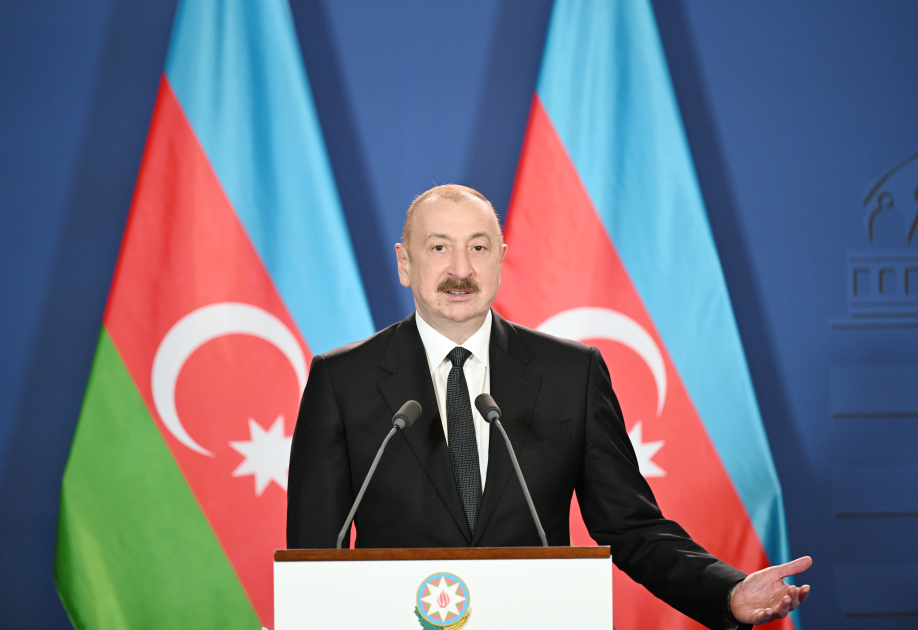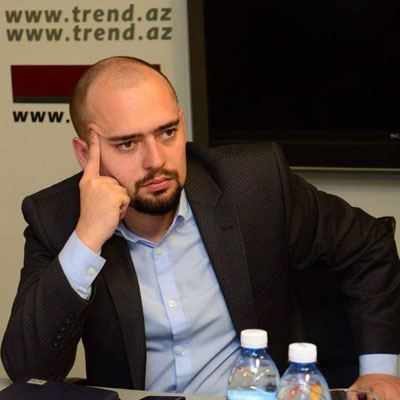BUDAPEST, Hungary, May 20. Hungary-Azerbaijan relations are developing successfully. We are friendly countries and strategic partners, President of the Republic of Azerbaijan Ilham Aliyev said, during his press statement with Hungarian Prime Minister Viktor Orbán in Budapest on May 20, Trend reports.
Statement by President Ilham Aliyev
-Dear Mr. Prime Minister, my dear friend.
Dear ladies and gentlemen.
Mr. Prime Minister, first of all, I would like to express my gratitude to you for the invitation and warm hospitality. I frequently visit Hungary. My last visit was in 2023. You also often visit Azerbaijan. Your last visit was in November last year. In other words, this shows that the contacts between us are regular and Azerbaijan-Hungary relations are developing successfully.
We are friendly countries, and strategic partners. During today's negotiations and the meeting in a limited format, we once again saw that our positions on many issues coincide. When we observe the developments taking place in the changing world today, there is still no major difference in our positions. There are many similarities between Azerbaijan and Hungary. First, our historical roots. I know that the Hungarian people are very attached to their historical roots. The population of our countries is approximately the same, and the area of our countries are very close to each other. One of the similarities is that, as you also noted, Hungary is a landlocked country. Azerbaijan is also one of such countries. Although, we are located on the coast of the Caspian Sea, but we also have no access to the world ocean. You also noted that Hungary borders a country that is at war. We are in the same situation. You border one country that is at war, and we border another. So, these similarities naturally create a good basis for mutual understanding because we are facing almost the same challenges.
Azerbaijan was also a country that was at war four and a half years ago. We fought a war on our own soil. We ended the 30-year occupation of our lands by Armenia. Indeed, our war was not fought for more than three years like the Russia-Ukraine War – it lasted only 44 days. Every day we advanced, we did not take a step back, there was not a single deserter in our army, while, by their own admission, the Armenian army had 12,000 deserters.
The Second Karabakh War was fought within the framework of international law - based on the UN Charter. Article 51 of the UN Charter states that every country has the right to self-defense. And we, exercising this right, liberated the lands that had been under occupation for many years from enemy forces and fully restored our sovereignty in 2023.
Regarding the Armenia-Azerbaijan peace process, I can say that we were the initiators of the peace negotiations after the Second Karabakh War. We were the authors of the text of the peace agreement, and this text has been accepted by Armenia today - of course, with certain amendments. But in principle, the issue we proposed has already been accepted by Armenia. However, there are two main conditions for concluding a peace treaty. First, the Armenia's constitution still contains territorial claims against Azerbaijan. This must be changed. Second, the OSCE Minsk Group, which was established to resolve the Karabakh conflict, must be abolished. It no longer functions de facto, and its de jure abolition is a must. Unfortunately, the Armenian side does not want to accept these two conditions yet. However, the events of recent years and the course of the processes show that sooner or later they will have to agree to our proposal. Because there is nothing extraordinary in those proposals.
Our bilateral agenda is also quite extensive. We discussed this in detail today. We are successfully cooperating in the energy sector. Hungarian companies have stakes in two major oil and gas projects in Azerbaijan - the Azeri-Chirag-Guneshli and Shah Deniz fields. The next contract will be signed early next year. We also exchanged views on this today. A Hungarian company will begin operating in the onshore oil fields of Azerbaijan. We have been exporting natural gas to Hungary since last year. I noted today, and the Prime Minister noted here too, that we can arrange gas supply at the level of Hungary's demand. Our gas resource base is quite extensive and is expanding, new gas fields will be put into operation. Today, we export natural gas to 12 countries, and ten of them are European countries, eight are members of the European Union. The European Commission recognizes Azerbaijan as a Pan-European gas supplier and a reliable partner. If we look at the geography of our gas exports, we can see that Azerbaijan holds leading positions in the world not only in Europe, but also globally in terms of the geographical coverage of pipeline-based gas transportation. Our future plans include the development of gas reserves. We are also working with Hungary on green energy. Azerbaijan has a very large-scale green energy agenda. We will produce 6,000 megawatts of green energy over the next five years. Over the past two years, 500 megawatts have been created, 6,000 megawatts will be provided over the next five years. I am stating all these figures based on contracts, that is, these are projects that will be implemented. Thus, these projects alone will enable us to save about 3-4 billion cubic meters of gas, the main destination of which, of course, will be Türkiye and European countries.
In all other issues, we are also working together as two friendly and partner countries. As you know, tomorrow, at the initiative of Hungary, the second informal summit will be held. The first summit was held in Shusha, Karabakh, last year. Azerbaijan was the initiator of informal summits of the Organization of Turkic States, and Hungary took over this torch from us, and we welcome it. This once again shows that Hungary is very attached to its historical roots, which makes us very happy.
In conclusion, I would like to congratulate Hungary on its achievements. We know that Hungary is one of the few countries that pursues an independent policy. It is quite difficult to pursue an independent policy, especially within the framework of the European Union. Because there are many rules, many established principles, and the common foreign policy of the European Union is naturally one of the principles. Nevertheless, my friend Victor Orbán has always put the state and national interests of Hungary above everything else. We applaud this. He has always protected the interests of Hungary, joined initiatives that were beneficial to Hungary, and always avoided initiatives that were not. I repeat, pursuing this policy within the European Union, I can say, requires enormous heroism, requires political will, and requires a thought-out policy. Hungary has all of this. We hold great affection for Hungary, for these reasons and many more. We wish you and the friendly people of Hungary continued success on this path.
Thank you.







